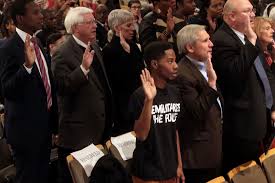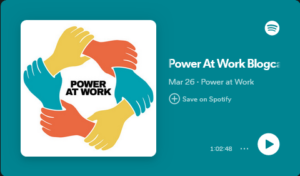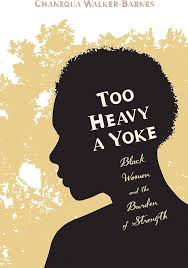Published at St. Louis American, November 30, 2015
 Rasheen Aldridge is an organizer with the Show Me $15 Campaign. The 2013 recipient of the Jamala Rogers Young Visionary Award, he emerged as one of the prominent leaders of the Ferguson Uprising. He became the youngest member of Ferguson Commission convened by Missouri Governor Jay Nixon. He wanted to represent the young people “who feel like their voices and lives don’t matter in this world.” The commission expires December 31.
Rasheen Aldridge is an organizer with the Show Me $15 Campaign. The 2013 recipient of the Jamala Rogers Young Visionary Award, he emerged as one of the prominent leaders of the Ferguson Uprising. He became the youngest member of Ferguson Commission convened by Missouri Governor Jay Nixon. He wanted to represent the young people “who feel like their voices and lives don’t matter in this world.” The commission expires December 31.
Jamala Rogers: You were pulled into organizing for economic justice pretty early in life. What were the conditions that got you into organizing?
Rasheen Aldridge: When I was growing up I didn’t really know about social justice or organizing. My mom was real active in the 5th Ward, and I used to tag along with her to various activities put together by Alderwoman April Ford Griffin. I started to learn more about my community – what we have and what we didn’t have.
I lived in the city, but I went to county schools from kindergarten to graduation. I lived in two different worlds. In the county, there were plenty of resources and things to do. It made me wonder why we all couldn’t have those same opportunities. When I went back to my neighborhood, it felt like I was in a cage. I was stuck in the house because there wasn’t a whole lot to do. If I hung out with friends, I would get harassed by the police.
I watched my mom fight to make life better and began thinking about ways to help my people, to help my community. Shortly after graduation, I met Justin Stein who was an organizer with Jobs with Justice. Justin taught me that the issues were greater than just my backyard, bigger than my ward—they were regional and national, even international. Justin took me under his wing and really opened up my eyes to how these issues were connected. He also introduced me to the groups that were working on these issues.
Jamala Rogers: As the youngest member of the Ferguson Commission, what did you learn about the process of citizen engagement?
Rasheen Aldridge: I was very hesitant about joining the commission for multiple reasons, starting with the person who set it up. Before Ferguson, I didn’t think Governor Nixon had really been there for the African-American community. I wondered what my peers would think about me being on the commission. I was on the frontlines of Ferguson, my loyalty was with the young people and the community. There were times when the governor could’ve come to talk with us, but instead he sent the National Guard on us. So, for him to call for a commission to find healing was a little confusing.
When the commission was formed, it was still very hot in Ferguson and it was right before the non-indictment of Darren Wilson. I thought more community people should’ve replaced some of the CEOs who were there. At one point, I wanted to resign because I thought it was going to be a bogus commission.
Again, I found myself in two different worlds. In one space, I am supposed to talk about healing and radical reconciliation—how to move forward. In another space, I’m still out in the streets dealing with my own pain, as well as the pain of my other brothers and sisters. We were being treated like crap at the hands of police but you want me to be at this table representing young people, to try to find the light at the end of the tunnel. It was tough because my heart wasn’t in a place to find change.
I got validation from commission members like Starsky Wilson and Traci Blackmon that the work in the streets was also important, that the work won’t stop with the commission, and that there’s more than one avenue to get to change.
Jamala Rogers: What did you learn about yourself in the process of this kind of engagement?
Rasheen Aldridge: I did find value in hearing different perspectives from some who didn’t get it and from some who wanted to get it. I learned that you can have your radicalness and still sit at the table with people from different backgrounds.
There was members like Becky Hatter of Big Brothers Big Sisters who heard stories from brothers and sisters about what they go through on a daily basis. They were just stories for her because she doesn’t have to experience the impact of the conditions they face, but she was trying to better understand their reality.
I didn’t always agree with Kevin Ahlbrand, but I think we all learned some inside views about the police brotherhood and how we can hold police departments accountable. We gotta hold people accountable – police, politicians, everyone. This isn’t short term work. I think a lot of us young people are angry and want victory now but, honestly, this is a long-term struggle.
Jamala Rogers: What was your biggest disappointment about the commission’s work?
Rasheen Aldridge: I felt like we wasted a lot of time at the beginning with bureaucratic and tedious stuff, talking about traditional kinds of recommendations instead of unflinching recommendations that were going to change the system. Programs are fine, but we need more opportunities and equality. We were being a typical commission.
It took Starsky’s leadership to wake us up and remind us that we called on to do this work because of the young people in the streets. There would be no commission if there weren’t young people who decided they weren’t going home every night because they are tired of the daily injustices they face.
On a personal level, I was disappointed in my early participation on the commission. Though I was a loudmouth in the streets, I was a little intimidating by some of the members of the commission, sitting at the table with these bigwigs, thinking they all knew more than me. I sold myself short for a couple of months until I realized that none of these members had the experiences that I have, so why wasn’t I speaking up?
Jamala Rogers: What do you think was your impact on the commission?
Rasheen Aldridge: Being me, being who I am, giving my views as a young, black man. Brittany Packnett helped me to understand that as the youngest members of the commission, our voices were important and we needed to speak up. There were a lot of old members who didn’t have a clue about what it means to be a young person right now.
Jamala Rogers: What is your vision for a just St. Louis?
Rasheen Aldridge: My vision is a complete overhaul for St. Louis. It’s not only about laws and policies, we also need to change the people in office. You don’t have to be black either, just fight harder for the people. You look at someone like Alderwoman Megan Green, who’s white and was more progressive on the minimum wage bill than some of the black alderpeople.
We are all citizens who are supposed to have rights. We are gonna have to fight for those rights in the streets and in the board rooms. We gotta be everywhere. Participation in the process can be nasty and disgusting, but it’s necessary to get to real change.



